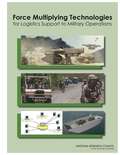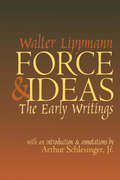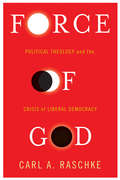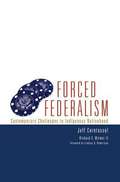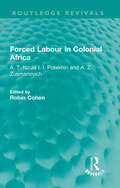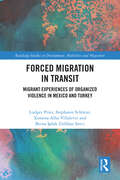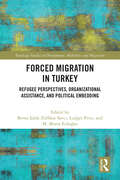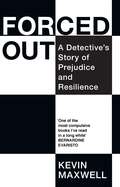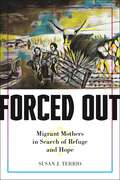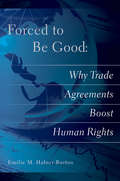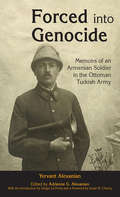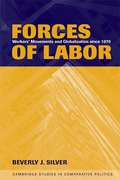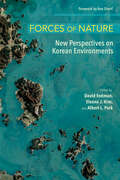- Table View
- List View
Forbidden Nights with the Viscount (Hadley's Hellions #1)
by Julia JustissAway from society's prying eyes... After suffering the loss of her beloved husband, quick-witted Lady Margaret Roberts has sworn off the pursuit of passion...that is, until she meets Giles Hadley. Bitterly estranged from his family, reluctant viscount Giles knows all too well the devastation of an unhappy marriage. So while he is prepared to indulge in an illicit affair, he must beware, for spirited Maggie awakens in him something even more forbidden-the desire to claim her as his wife!
Forbidden Wife: The Life and Trials of Lady Augusta Murray
by Julia Abel SmithOn the night of 4 April 1793, two lovers were preparing to compel a cleric to perform a secret ceremony. The wedding of the sixth son of King George III to the daughter of the Earl of Dunmore would not only be concealed – it would also be illegal.Lady Augusta Murray had known Prince Augustus Frederick for only three months but they had already fallen deeply in love and were desperate to be married. However, the Royal Marriages Act forbade such a union without the King’s permission and going ahead with the ceremony would change Augusta’s life forever. From a beautiful socialite she became a social pariah; her children were declared illegitimate and her family was scorned.In Forbidden Wife Julia Abel Smith uses material from the Royal Archives and the Dunmore family papers to create a dramatic biography set in the reigns of Kings George III and IV against the background of the American and French Revolutions.
Force Multiplying Technologies for Logistics Support to Military Operations
by Committee on Force Multiplying Technologies for Logistics Support to Military OperationsThe mission of the United States Army is to fight and win our nation's wars by providing prompt, sustained land dominance across the full range of military operations and spectrum of conflict in support of combatant commanders. Accomplishing this mission rests on the ability of the Army to equip and move its forces to the battle and sustain them while they are engaged. Logistics provides the backbone for Army combat operations. Without fuel, ammunition, rations, and other supplies, the Army would grind to a halt. The U. S. military must be prepared to fight anywhere on the globe and, in an era of coalition warfare, to logistically support its allies. While aircraft can move large amounts of supplies, the vast majority must be carried on ocean going vessels and unloaded at ports that may be at a great distance from the battlefield. As the wars in Afghanistan and Iraq have shown, the costs of convoying vast quantities of supplies is tallied not only in economic terms but also in terms of lives lost in the movement of the materiel. As the ability of potential enemies to interdict movement to the battlefield and interdict movements in the battlespace increases, the challenge of logistics grows even larger. No matter how the nature of battle develops, logistics will remain a key factor. "Force Multiplying Technologies for Logistics Support to Military Operations" explores Army logistics in a global, complex environment that includes the increasing use of antiaccess and area-denial tactics and technologies by potential adversaries. This report describes new technologies and systems that would reduce the demand for logistics and meet the demand at the point of need, make maintenance more efficient, improve inter- and intratheater mobility, and improve near-real-time, in-transit visibility. "Force Multiplying Technologies" also explores options for the Army to operate with the other services and improve its support of Special Operations Forces. This report provides a logistics-centric research and development investment strategy and illustrative examples of how improved logistics could look in the future.
Force and Ideas: The Early Writings
by Walter LippmannThe acclaim for Lippmann the political thinker has at times obscured the equally impressive accomplishments of Lippmann the journalist. His output was prodigious, his influence on journalism significant. According to James Reston: "He has given a generation of newspapermen a wider vision of their duty." Early Writings provides a unique opportunity to rediscover this journalistic Lippmann and to observe the formative years of a brilliant mind.In 1913, just three years out of Harvard, Lippmann was asked by Herbert Croly to help plan and edit a new "weekly of ideas," the New Republic. Beginning with its first issue in 1914 and continuing through the following six years, Lippmann wrote numerous signed and unsigned articles. Here are the best of them, written during the exciting political era that began with the trauma of World War I and ended in the stasis of Republican Normalcy.Pulitzer Prize-winning historian, Arthur Schlesinger, Jr., places Lippmann in historical context while recreating the intellectual ambiance of the Wilsonian era. His annotations identify little-remembered personages and clarify issues that time has befogged. But in another sense, the issues and personages of 1910-1920 are only too familiar. Our world is still a world of war, ineffectual international political organizations, disappointed idealism, nerve-wracking platitudes, social unrest, and slinking politicians.
Force and Statecraft: Diplomatic Challenges of Our Time (Fourth Edition)
by Paul Gordon Lauren Gordon A. Craig Alexander L. GeorgePart One focuses upon the historical context of force and statecraft. Following a completely new Introduction, it ranges from a substantially restructured discussion of the early techniques, instruments, and ideas of diplomacy to the profoundly dangerous changes brought about by contemporary weapons of mass destruction and terrorism. Chapters cover the emergence of the Great Powers, the classical system of diplomacy, the diplomatic revolution, the creation of the United Nations, the rise and fall of the Cold War, globalization and the consequences of the Internet, and events as recent as 9/11, the Bush Doctrine, the "war on terrorism" and the American-led war in Iraq, nuclear proliferation in Iran and North Korea, and the World Summit of global leaders. Significant new material is added to this edition on the critical subject of human rights and its relationship to international peace and security. Part Two begins with the completely new and pivotal chapter on the subject of "Lessons of History and Knowledge for Statecraft." Each subsequent chapter then proceeds to systematically examine an especially important and challenging subject in diplomacy by means of delineating its theoretical principles and then analyzing three very specific historical cases in equal detail. The first of these always is drawn from the classical system of the nineteenth century, and the other two follow in a progression toward increasingly more recent events in contemporary international affairs. Particular care has been taken in this edition to include a number of new cases that reveal the truly global dimensions of these diplomatic challenges and thus range from Europe and the United States to the Middle East and Asia. Part Three opens with an entirely new chapter entitled "Ethics and Other Restraints on Force and Statecraft." This explores practical, structural, and political restraints upon policy makers; the debate over the nature of ethics and international politics; ethical restraints in foreign policy; and the difficult matter of observing ethical restraints, such as those of just war tradition, in warfare itself. A completely rewritten and updated Conclusion brings the major themes of the book together and offers a number of reflections about history, theory, the diplomatic revolution, and challenges ahead.
Force of God: Political Theology and the Crisis of Liberal Democracy (Insurrections: Critical Studies in Religion, Politics, and Culture)
by Carl RaschkeFor theorists in search of a political theology that is more responsive to the challenges now facing Western democracies, this book tenders a new political economy anchored in a theory of value. The political theology of the future, Carl Raschke argues, must draw on a powerful, hidden impetus—the "force of God"—to frame a new value economy. It must also embrace a radical, "faith-based" revolutionary style of theory that reconceives the power of the "theological" in political thought and action.Raschke ties democracy's retreat to the West's failure to confront its decadence and mobilize its vast spiritual resources. Worsening debt, rising unemployment, and gross income inequality have led to a crisis in political representation and values that twentieth-century theorists never anticipated. Drawing on the thought of Hegel and Nietzsche as well as recent work by Michel Foucault, Jacques Derrida, Jean-Joseph Goux, Giorgio Agamben, and Alain Badiou, among others, Raschke recasts political theology for a new generation. He proposes a bold, uncompromising critical theory that acknowledges the enduring significance of Marx without his materialism and builds a vital, more spiritually grounded relationship between politics and the religious imaginary.
Force of Words: The Logic of Terrorist Threats (Columbia Studies in Terrorism and Irregular Warfare)
by Joseph M. BrownTerrorist groups attain notoriety through acts of violence, but threats of future violence are just as important in attaining their political goals. Force of Words is a groundbreaking examination of the role of threats in terrorist strategies. Joseph M. Brown shows how terrorists use threats, true and false, to achieve key outcomes such as social control, economic attrition, and policy concessions. Brown demonstrates that threats are integral to terrorism on a tactical level as well, distracting security forces, drawing police into traps, and warning civilians out of harm’s way when terrorists seek to limit casualties.Force of Words reorients the field of terrorism studies, prioritizing the symbolic, psychological dimension that makes this form of conflict distinctive. It expands the study of terrorist propaganda by detailing how militants tailor their threats to send the desired political message. Drawing on rich interview data, quantitative evidence, and case studies of the IRA, ETA, the Tamil Tigers, Shining Path, the Túpac Amaru Revolutionary Movement, Boko Haram, the Afghan Taliban, and ISIL, the book offers practical guidance for interpreting terrorists’ threats and assessing their credibility. Force of Words is essential reading for anyone seeking to understand the logic of terrorism.
Forced Displacement and Migration: Approaches and Programmes of International Cooperation
by Christoph Beier Dirk Messner Hans-Joachim PreußThis book presents effective long-term solutions for displacement and migration against the background of the current debates. It offers insights on practical suggestions for dealing with displacement and migration due to violence, examines ideas for the management of global migration movements and looks into the integration of refugees and migrants. Throughout the chapters, experts from science, politics and practice shed light on the causes of global migration and the consequences of migration on a political, economic and social level. The focus of the discussion is not the avoidance of migratory movements, but above all the use of positive effects in countries of origin, transit and destination.The book is a must-read for researchers, policy-makers and politicians, interested in international cooperation and in a better understanding of causes, consequences and solutions of displacement and forced migration.
Forced Federalism: Contemporary Challenges to Indigenous Nationhood (American Indian Law and Policy Series Volume #3)
by Jeff Corntassel Richard C. WitmerOver the past twenty years, American Indian policy has shifted from self-determination to “forced federalism,” as indigenous nations in the United States have encountered new threats from state and local governments over such issues as taxation, gaming, and homeland security. During the forced federalism era (1988–present), public perceptions of indigenous peoples as “rich Indians” have been just as damaging to Native nations as anti-sovereignty legislation. This book examines how state governments have manipulated “rich Indian” images when setting policies targeting indigenous peoples and discusses how indigenous nations have responded politically to these contemporary threats to their nationhood. Drawing on original survey data collected from Native governments from 1994 to 2000 and on interviews with Chief Chad Smith of the Cherokee Nation as well as other indigenous leaders, Jeff Corntassel and Richard C. Witmer II examine the power dynamics of the indigenous-state compacting system, and show how electoral activism among indigenous peoples has increased their political power while also giving rise to “rich Indian racism” among non-Indians—especially in the wake of the Indian Gaming and Regulatory Act. The authors warn that current widespread Native participation in non-Native politics is undermining both the political and the cultural foundations of indigenous nationhood, especially as the American culture of money gains influence in Native politics. They also offer specific strategies for regenerating indigenous communities in order to meet future challenges to their nationhood.
Forced Labour in Colonial Africa: A. T. Nzula I. I. Potekhin and A. Z. Zusmanovich (Routledge Revivals)
by Robin Cohen Hugh Jenkins A. T. Nzula I. I. Potekhin A. Z. ZusmanovichOriginally published for the first time in English in 1979 this book represents one of the earliest Marxist analyses of the impact that colonialism had on Africa during the first half century that followed the Scramble. Nzula’s co-authored book, together with all his writings in the Negro Worker, are assembled here. The political experience of its African co-author resulted in a book which is alight with commitment to the liberation of the Continent, yet always tempered by an explicit theoretical understanding of capitalism in its imperialist phase. The book opens with an outline of Africa’s role in the world economic system. Successive chapters reveal how Western capitalism conjured up a brutally exploited working class and dispossessed peasantry throughout the African continent. Each major region of Black Africa is analysed. Meticulous information as to the facts of oppression and many of the early urban and rural struggles against colonialism before the Second World War is set out. Robin Cohen’s introduction is a valuable summation of Nzula’s life and of the background to this book. The appendices bring together many of Nzula’s little known writings.
Forced Migration across Mexico: Organized Violence, Migrant Struggles, and Life Trajectories (Routledge Studies in Development, Mobilities and Migration)
by Ludger Pries Stephanie Schütze Ximena Alba Villalever Oscar Calderón MorillónThis book analyzes the different ways in which forced migration comes together with organized violence in the Americas, focusing specifically on the migration corridor from Central America, through Mexico and on to the United States. No matter their starting point, most South and Central American migrants to the United States must eventually traverse Mexico, and often many other borders beforehand, to reach their destination. As border controls tighten, for many migrants turning back is not a possibility, or something they desire. And so, when faced with hardening policies, migrants are often forced into situations of increased violence and precarity, without a shift in their ultimate objective. This book analyzes the complex social situations of everyday violence, and increasingly aggressive border controls, which face migrants in Mexico, as well as their exposure to a different kind of violence during their migration trajectory through the criminal actors such as gangs, cartels, and corrupt law enforcements that seek to make a profit from them. The book takes a critical approach on migration policies and on the externalization of borders by analyzing their effects on the trajectories and experiences of migrants themselves. It shows that the more migrants’ opportunities and rights during transit are hindered, the more they are at risk of exposure to these actors. Foregrounding the voices of migrants, this book offers fresh insights into debates surrounding migration, politics, international relations, and anthropology in the Americas.
Forced Migration and Humanitarian Action: Operational Challenges and Solutions for Supporting People on the Move (Routledge Humanitarian Studies)
by Lorenzo Guadagno Lisette R. RoblesForced population movements are a defining feature of almost any humanitarian crisis, shaping the design, targeting, and delivery of emergency responses.This book investigates how the evolving situation of different forced migrants is accounted for and addressed in humanitarian action in order to improve their access to support and assistance. Bringing together case studies from Africa, Asia, Europe, and the Pacific, this book focuses on a diversity of operational modalities and types of assistance provided by both traditional and non-traditional humanitarian actors to address the specific needs of displaced children, women, people with disabilities and older people, as well as trafficked migrant workers.This book adopts a broad perspective on humanitarian action, acknowledging how its boundaries are challenged and expanded in forced migration contexts. Its operational and theoretical insights will be useful for a range of readers, from humanitarian and migration researchers and students to practitioners and policymakers.
Forced Migration and Separated Families: Everyday Insecurities and Transnational Strategies (IMISCOE Research Series)
by Marja Tiilikainen Johanna Hiitola Abdirashid A. Ismail Jaana PalanderThis open access book examines the impacts and experiences of family separation on forced migrants and their transnational families. On the one hand, it investigates how people with a forced migration background in Europe, the Middle East, and Latin America experience separation from their families, and on the other, how family and kin in the countries of origin or transit are impacted by the often precarious circumstances of their family members in receiving countries. In particular, this book provides new knowledge on the nexus between transnational family separation, forced migration, and everyday (in)security. Additionally, it yields comparative information for assessing the impacts of relevant legislation and administrative practice in a number of national contexts. Based on rich empirical data, including unique cases about South-South migration, the findings in this book are highly relevant to academics in migration and refugee studies as well as policy-makers, legislators and practitioners.
Forced Migration and Urban Transformation in South Asia: Displacement, Resettlement, and Poverty
by S. Irudaya Rajan Rajith W. D. LakshmanThis book discusses the displacement of urban populations, inequality, and poverty in three cities in South Asia—Colombo, Jaffna in Sri Lanka, and Kochi in India. It focuses on the long-term effect resettlement and relocation has on the lives and livelihoods of urban internal displacement of populations (IDPs) primarily from urban poor classes. It also discusses the concerns faced by the displacement in post-war Sri Lanka. It examines the impacts of conflict on poverty and recovery in peri-urban settings. It emphasizes the role of agency of urban IDPs in strengthening their own well-being. It draws attention to how the agency of urban IDPs is compromised by the displacement processes and the weak local level governance structures in the cities. The book is intended for researchers, graduate students, and teachers of Geography, Social Policy, Refugees and Migration Studies, History, International Development, Urban Studies, and South Asian Studies.
Forced Migration in Transit: Migrant Experiences of Organized Violence in Mexico and Turkey (Routledge Studies in Development, Mobilities and Migration)
by Ludger Pries Stephanie Schütze Ximena Alba Villalever Berna Safak Zülfikar SavciThis book compares the life courses of forced migrants in two of the world’s most important transit countries: Turkey and Mexico. It examines the local, regional, and global contexts of their experiences, trajectories, and biographical projects, caught between return, stay, and forward movement.Forced migration has increased rapidly around the world in recent years, with Mexico and Turkey experiencing particularly high numbers of migrants, as conflict, violence, authoritarian regimes, environmental disasters, economic instability, lack of opportunity, and generalized violence have driven people to leave their homes in search of a better life. With a special focus on organized violence, this book analyzes the specific impact of organized violence on the trajectories and biographies of forced migrants, situating these life courses in the political, economic, cultural, and social contexts of the countries of origin (Afghanistan, Iraq and Syria; El Salvador, Guatemala, and Honduras) and in the country of transit (Turkey and Mexico). Using extensive original empirical data and analysis, it argues that forced migration is a long-lasting social process based on everyday actions and social practices throughout the migration trajectory.Systematically comparing two of the world’s most important transit countries, this book will be of interest to researchers in the fields of migration, politics, international relations, and sociology.
Forced Migration in Turkey: Refugee Perspectives, Organizational Assistance, and Political Embedding (Routledge Studies in Development, Mobilities and Migration)
by Ludger Pries Şafak Zülfikar Savcı, Berna M. Murat ErdoğanTurkey hosts more refugees than any other country in the world, with forced migrants from Syria, Afghanistan, Pakistan, Iraq, and other countries converging, either with hopes to settle in Turkey or to continue onwards to the European Union (EU).This volume addresses the specific experiences and trajectories of forced migrants in Turkey in the context of local and national contexts and the future of EU-Turkey relations. It presents the demographics of forced migrants, the biographies and future plans of refugees, and their interactions with civil society, states, and international agencies. A focus is on organized violence and corresponding experiences in countries of origin, during transit, and at current places.Based on extensive quantitative and qualitative research, this book will be of interest to researchers and practitioners in the fields of migration, human security, and refugee studies, as well as of sociology, political sciences, and international relations.
Forced Out: A Detective's Story of Prejudice and Resilience
by Kevin MaxwellA gay, black, British police officer&’s memoir of prejudice, racism and homophobia on the force in the twenty-first century.Kevin Maxwell was a dream candidate for the police force—he had a long-held desire to serve his community, a strong moral compass and a clear aptitude for both the strategic and practical aspects of policing. And, as a gay black man from a working-class family, he could easily have been a poster boy for the force&’s stated commitment to equal opportunities. Joining just after the 9/11 attacks, Kevin entered policing determined to keep communities safe in the face of a changing world. But instead, he came up against entrenched prejudice, open racism and homophobia. For more than ten years, Kevin strove against the odds, until he took the force to an employment tribunal—with devastating results.Forced Out is a revelatory exposé combining deeply affecting memoir with sharp analysis and a fascinating insider perspective on day-to-day life in the force. It is a touchstone for the silent many who have either tried to ignore abuse for the sake of their career or who have been bullied out of their jobs. It paints a sobering portrait of an institution that has not yet learned the lessons of the past and whose prejudice is informing the cases it chooses to investigate and the way it investigates them. And it asks the important question: what needs to change?&“One of the most compulsive books I&’ve read in a long while.&” –Bernadine Evaristo, award-winning author of Girl, Woman, Other
Forced Out: Migrant Mothers in Search of Refuge and Hope
by Susan J. TerrioFeatures the stories of undocumented mothers who reunite with their children in the US years after fleeing violence at homeFacing escalating chaos and violence in their home countries, many Central American mothers have found that a desperate flight to the north was their only choice. Many left their children behind in order to spare them the hardships of the journey. If they made it across the border without getting locked up or deported, they entered a country increasingly unwilling to recognize claims of asylum.This book features the stories of women who crossed the border without encountering immigration authorities, in some cases several times, and settled in the greater Washington, DC, area, living in the shadows for years. By centering on the voices of the women themselves, it offers an intimate look at what drove them from home and the challenges they face in reuniting years later with their children.Forced Out traces the women’s evolving attitudes toward the violence embedded in institutions and everyday life in their home countries, as well as their continued vulnerability and dependence in the US. It also highlights the challenges they face in parenting children adapting to American society and learning English while living with mothers who had left them years before and become strangers to them. Rather than sensationalizing their trauma or dwelling on their vulnerability, the stories reveal the women’s rich, complex inner lives, their resilience in overcoming senseless violence, and their unswerving commitment to bettering their children’s lives. Clear, vivid, and impactful, this is a humbling and humane look at the state of migration to America today.
Forced To Be Good: Why Trade Agreements Boost Human Rights
by Emilie M. Hafner-BurtonPreferential trade agreements have become common ways to protect or restrict access to national markets in products and services. The United States has signed trade agreements with almost two dozen countries as close as Mexico and Canada and as distant as Morocco and Australia. The European Union has done the same. In addition to addressing economic issues, these agreements also regulate the protection of human rights. In Forced to Be Good, Emilie M. Hafner-Burton tells the story of the politics of such agreements and of the ways in which governments pursue market integration policies that advance their own political interests, including human rights. How and why do global norms for social justice become international regulations linked to seemingly unrelated issues, such as trade? Hafner-Burton finds that the process has been unconventional. Efforts by human rights advocates and labor unions to spread human rights ideals, for example, do not explain why American and European governments employ preferential trade agreements to protect human rights. Instead, most of the regulations protecting human rights are codified in global moral principles and laws only because they serve policymakers' interests in accumulating power or resources or solving other problems. Otherwise, demands by moral advocates are tossed aside. And, as Hafner-Burton shows, even the inclusion of human rights protections in trade agreements is no guarantee of real change, because many of the governments that sign on to fair trade regulations oppose such protections and do not intend to force their implementation. Ultimately, Hafner-Burton finds that, despite the difficulty of enforcing good regulations and the less-than-noble motives for including them, trade agreements that include human rights provisions have made a positive difference in the lives of some of the people they are intended-on paper, at least-to protect.
Forced into Genocide: Memoirs of an Armenian Soldier in the Ottoman Turkish Army (Genocide Studies)
by Adrienne G. AlexanianThis memoir recalls Yervant Alexanian’s death-defying experiences in the center of the Armenian Genocide. Like other Armenians of his generation, he was an eyewitness to the massacre and dislocation of his family and fellow countrymen in Ottoman Turkey during World War I. Alexanian was conscripted into the Turkish army—but unlike others so conscripted, he survived. Alexanian was forced to become an onlooker while he watched the atrocities unfold. His story of resourceful action and fateful turns is a suspenseful “insider’s account” of a Genocide survivor. From his singular position, Alexanian was able to document the tragedy of his people in his journals and diaries, but he also offers us a behind-the-scenes look into the motivations and actions of Turkish military officials as they committed the atrocities. His story continues after the war as we follow the trail of his journey through Europe and finally to America, where he found solace and was able to start anew with fellow survivors. No comparable account exists in the literature of the Armenian Genocide. This edition, translated from Alexanian’s hand-written Armenian-language chronicle, includes never-before-seen documents and photos that the author preserved. Through his eyes we relive the astonishing cruelty of the Genocide’s perpetrators—but also rare, unexpected acts of humanity between victim and oppressor.
Forces for Good?
by Claire DuncansonThis book utilises the growing phenomenon of British soldier narratives from Iraq and Afghanistan to explore how British soldiers make sense of their role on these complex, multi-dimensional operations. It aims to intervene in the debates within critical feminist scholarship over whether soldiers can ever be agents of peace.
Forces of Fortune: The Rise of the New Muslim Middle Class and What It Will Mean for Our World
by Vali NasrFrom a "New York Times"-bestselling author comes a paradigm-changing revelation of the misunderstood rising force in the Islamic world--a non-extremist new middle class--that holds the key to winning the new Cold War against Iran and extremists.
Forces of Labor: Workers' Movements and Globalization Since 1870 (Cambridge Studies in Comparative Politics)
by Beverly J. SilverRecasting labor studies in a long-term and global framework, the book draws on a major new database on world labor unrest to show how local labor movements have been related to world-scale political, economic, and social processes since the late nineteenth century. Through an in-depth empirical analysis of select global industries, the book demonstrates how the main locations of labor unrest have shifted from country to country together with shifts in the geographical location of production. It shows how the main sites of labor unrest have shifted over time together with the rise or decline of new leading sectors of capitalist development and demonstrates that labor movements have been deeply embedded (as both cause and effect) in world political dynamics. ,p>Over the history of the modern labor movement, the book isolates what is truly novel about the contemporary global crisis of labor movements. Arguing against the view that this is a terminal crisis, the book concludes by exploring the likely forms that emergent labor movements will take in the twenty-first century.
Forces of Nature: New Perspectives on Korean Environments (The Environments of East Asia)
by David Fedman, Eleana J. Kim, and Albert L. ParkBringing together a multidisciplinary conversation about the entanglement of nature and society in the Korean peninsula, Forces of Nature aims to define and develop the field of the Korean environmental humanities. At its core, the volume works to foreground non-human agents that have long been marginalized in Korean studies, placing flora, fauna, mineral deposits, and climatic conditions that have hitherto been confined to footnotes front and center. In the process, the authors blaze new trails through Korea's social and physical landscapes.What emerges is a deeper appreciation of the environmental conflicts that have animated life in Korea. The authors show how natural processes have continually shaped the course of events on the peninsula—how floods, droughts, famines, fires, and pests have inexorably impinged on human affairs—and how different forces have been mobilized by the state to variously, control, extract, modernize, and showcase the Korean landscape. Forces of Nature suggestively reveals Korea's physical landscape to be not so much a passive context to Korea's history, but an active agent in its transformation and reinvention across centuries.This book is freely available in an open access edition through the generous support of the Henry Luce Foundation.
Forces of Order: Policing Modern Japan
by David H. BayleyPolice behavior in Japan and the United States


